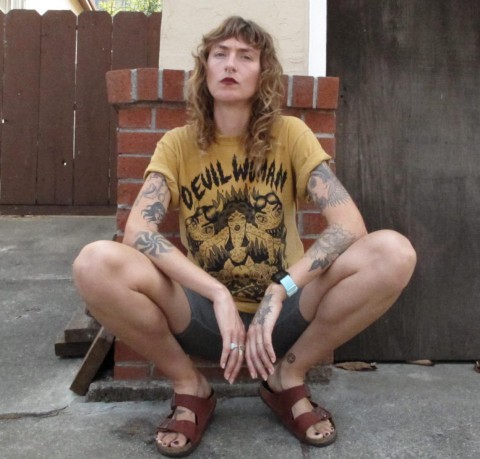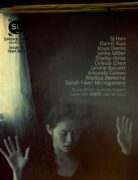You give us startling, wonderful pop culture references, which are both memory-based (watching A Thief in the Night) and imagination-based (Paw Patrol sheets). How do you decide on such specific and wide-ranging references?
Thanks so much for reading my work, and for sharing the title of the film I referenced. I actually hadn’t ever looked it up. I just remember being forced to watch it every night after bible study in the short time that I lived with a religious woman while my mother was away. It scared the shit out of me, and I guess it has just been living in the recesses of my mind for the last twenty years.
I think the media references exist partly because, like so many people my age, I grew up with a constant stream of imagery coming in from television, commercials, and then eventually the internet. All those images just sit around taking up space in my mind until they get summoned, or I forget them entirely. I think all my writing and thinking is probably directly and indirectly in conversation with every form of media I’ve encountered over the years—even imagery that feels peripheral, like advertisements, Tweets, Instagram photos, whatever, seeps in over time. In a lot of ways, writing is the act of sifting through all the junk I’m subjected to on a daily basis. I don’t know if the result is more junk or something else, but it’s my process for engaging with what I’m exposed to. The other layer to the specificity is probably a fear that my writing will come off as generic or unmemorable. Usually in revision my mantra is something like Be specific, more specific, OK, even more specific.
Lists appear and reappear here. Some embedded in paragraphs and others with poetic line breaks. Can you tell us about your process using list form and how you shaped the piece on the page?
Yeah, I think the lists function for me as both a way to be specific and also avoid extraneous details. I am always worried about too much exposition or language getting in the way of pacing, so the lists help move things along.
In “If On A Winter’s Night,” you wrote about the pitfalls of first-person narration. Here you shift between first and second person. Point of view shifts like this are often frowned upon, and yet, you make it work. Why did you risk using unconventional second-person point of view?
Thanks for reading “If On A Winter’s Night.” I feel kind of sentimental about that story. With that piece I was interested in how POV creates or dissolves agency in stories about sexual violence. I always think of POV choices as power choices. This idea is likely informed from having read books like Calvino’s If on a Winter’s Night a Traveler (from which the title was inspired) and Invisible by Paul Auster. There are probably many more writers whose voices are in my head when I explore this, too—Lorrie Moore, Lydia Davis, Gloria Frym, etc.
I guess when it comes to POV I’m usually asking, Who (reader/narrator/writer) is being protected and who is being implicated? Sometimes the choice is just intuitive, but other times choosing second person is a decision to implicate the reader. I also think second person can protect the narrator and/or the writer from being vulnerable. The switching from first to second person, at least in this essay, seemed fitting considering it’s about sobriety, and sobriety for me has been a messy, dissociative act in which I attempt to not give into my constant impulse to exist outside myself or too deeply inside myself.
I actually tried to resist shifting too frequently into second person in this essay because I worried I was relying on it to distance myself from the material. A SmokeLong editor suggested I emphasize the shift in the final section and the edit felt right. In that sense, it was communal, which is maybe the point.
Hashtags are incorporated into this piece as part of the narrator’s spiritual journey. How does your relationship to social media inform or complicate your spiritual and creative journey?
Well, my first thought here is simply I’m an addict and so my relationship with social media oscillates between attempting moderation and falling into full-on absorption. I go to great lengths to limit my internet/social media use (I have Wi-Fi blocking apps, I turn my phone off for half the day, etc.), but I definitely spend more time online than I would like to.
As far as spiritual/creative journey—for a long time I resisted using social media at all and didn’t have any accounts (or I regularly started and then deleted my accounts). I thought of SM solely as an extension of capitalism in the form of self-promotion and I didn’t know if there was a way to have a relationship with SM that didn’t disrupt my creative or mental health. Lately I’ve tried to be more neutral about social media. I try to think of it as a tool for forming relationships and engaging with artistic material rather than as a means of consuming or selling. That shift in perspective has allowed me to make some genuine connections with artists/writers I wouldn’t have met otherwise and I’m grateful for that. Sometimes I still resent that I engage with SM at all, but taking breaks helps. I also got/stayed sober by attending virtual sobriety meetings online. So, not to sound dramatic, but it has probably been lifesaving as well.
Is there anything else you’d wished I’d asked you?
Lol, I guess I thought you would ask something about sobriety since that’s what the essay is about, but I guess I brought it up myself, so no, I’m good. Thanks for the questions.



 In September 2022 SmokeLong launched a workshop environment/community christened SmokeLong Fitness. This community workshop is happening right now on our dedicated workshop site. If you choose to join us, you will work in a small group of around 15-20 participants to give and receive feedback on flash narratives—one new writing task each week.
In September 2022 SmokeLong launched a workshop environment/community christened SmokeLong Fitness. This community workshop is happening right now on our dedicated workshop site. If you choose to join us, you will work in a small group of around 15-20 participants to give and receive feedback on flash narratives—one new writing task each week.